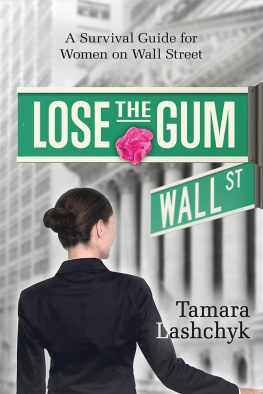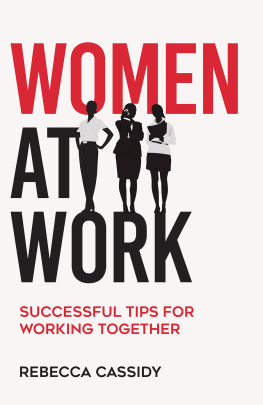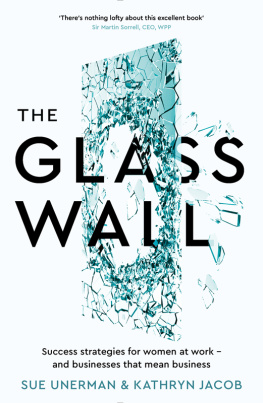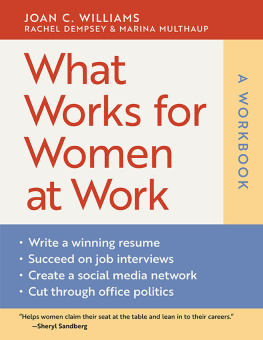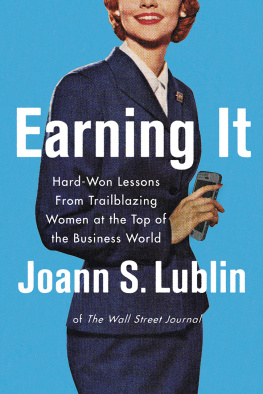LOSE THE GUM
A Survival Guide for Women on Wall Street
TAMARA LASHCHYK

Copyright 2017 Tamara Lashchyk.
All rights reserved. No part of this book may be used or reproduced by any means, graphic, electronic, or mechanical, including photocopying, recording, taping or by any information storage retrieval system without the written permission of the author except in the case of brief quotations embodied in critical articles and reviews.
Balboa Press
A Division of Hay House
1663 Liberty Drive
Bloomington, IN 47403
www.balboapress.com
1 (877) 407-4847
Because of the dynamic nature of the Internet, any web addresses or links contained in this book may have changed since publication and may no longer be valid. The views expressed in this work are solely those of the author and do not necessarily reflect the views of the publisher, and the publisher hereby disclaims any responsibility for them.
The author of this book does not dispense medical advice or prescribe the use of any technique as a form of treatment for physical, emotional, or medical problems without the advice of a physician, either directly or indirectly. The intent of the author is only to offer information of a general nature to help you in your quest for emotional and spiritual well-being. In the event you use any of the information in this book for yourself, which is your constitutional right, the author and the publisher assume no responsibility for your actions.
Any people depicted in stock imagery provided by Thinkstock are models, and such images are being used for illustrative purposes only.
Certain stock imagery Thinkstock.
ISBN: 978-1-5043-7437-8 (sc)
ISBN: 978-1-5043-7438-5 (e)
Library of Congress Control Number: 2017901990
Balboa Press rev. date: 02/27/2017
CONTENTS
And to all the little girls watching right now, never doubt
that you are valuable and powerful and deserving of every chance and opportunity in the world to pursue and achieve your own dreams.
Hillary Rodham Clinton
November 9, 2016
The majority of modern women have been cut off from the flow of their feminine energy and refuse its healing and grace. Without the feminine strengths of compassion, abundance, and kindness ruling our hearts, we neglect and abuse ourselves. Like nomads wandering in a desert of competition, dissatisfaction, and lack, we attempt to find solace in the masculine traits of force, aggressiveness, and dominance.
Unknown
THROUGHOUT MY CAREER ON Wall Street, Ive worked with many brilliant and talented women whom I respected for their ability to burgeon in this high-powered, yet challenging profession. But I have also watched as so many women have fumbled about trying to find their footing in Wall Streets masculine world. Women have been taught that the embodiment of certain female behaviors puts us at a disadvantage against our male counterparts, and so we dont embrace our feminine qualities in the workplace. Instead, we either stifle these qualities or we overcompensate by taking on masculine traits. But in either case, these actions arent inherently natural to us and prevent us from harnessing the full potential of our feminine power. This limits our capabilities and can directly translate into fewer pay increases, promotions, and opportunities for mobility. Essentially, we are standing in our own way.
While our behaviors shut us out of opportunities, the lack of awareness also plays a role, as we sabotage ourselves and destroy our chances for what could have been a vibrant career. Every woman contributes to the overall female business statistics and every woman who has left the workplace is part of the reason why these statistics havent improved in a meaningful way in more than a generation. A recent study by McKinsey and LeanIn.org shows that, at the current rate of change, it will take women 100 years to reach parity in the C-suite. All research supports a business case for gender diversity, yet every workplace study ever conducted on gender equality shows that women are at a disadvantage. This is not an excuse, but a fact that is changing at a painfully slow rate.
Ive witnessed these statistics in the making first hand as Ive watched many talented women walk out the door and opt-out of this industry altogether. Because diverse organizations foster greater innovation, creativity, and bottom line results, the financial services industry with its limited female perspective, has missed out on an immeasurable amount of contributions. And while some women leave this industry because of personal life choices, many women leave out of frustration and hopelessness (though they may still hide behind the label of life choices). I was raised to believe that opportunity should be available to anyone who wants it and leaving the workforce because you feel that you have no options is, to me, entirely unacceptable.
As I rose through the ranks in Wall Street, I saw more opportunities afforded to men than to women. Even though I was often allowed into the boys club, I still felt that men had an unfair advantage because of their gender. And while my father had always preached that life wasnt necessarily fair, I wanted to have the same opportunities that were available to men, regardless. I was among the few privileged women to be included in many of the inner circles (aka the boys clubs), but I refused to let my willful blindness turn into plausible deniability. So, I did what I could to promote inclusion. I challenged management by drawing their attention to examples of inequities in order to force a more balanced ratio. My objective was to create an environment where women felt supported, so I also spent countless hours mentoring and coaching young women. But at the end of the day, I still watched helplessly as too many women would exit this industry.
After twenty something years in this business, I realized that all women face the same challenges because we are all trying to navigate a system of protocols that never took us into consideration in the first place. I wrote Lose the Gum to raise awareness of these protocols and to offer some guidance on how to steer through them. In a hierarchical environment, the rules or established protocols arent always clear, and missteps along the corporate path can be damaging to your career. I know that the playing field isnt level, but in writing this book, I hope to tilt the scales a little closer to the middle and lay the groundwork for other women to balance them completely.
This book is meant to be a practical guide to outline the unwritten rules of Wall Streets corporate culture and offer some ideas on how to manage perceptions within these protocols. This is merely a guideline and isnt meant to be a panacea that guarantees success, nor does it inoculate against failure. I also offer no delusions about being your authentic self or the belief that if you are true to yourself, corporate culture will embrace you, because, from my experience, it probably will not . It may even chew you up and spit you out. But that doesnt mean that you should sell out either because you should never change your core values for anyone or anything. It simply means that you need to understand the consequences of your actions in order to make a conscious decision about which core values and which character traits you allow yourself to reveal in order to create your professional identity. It is important to be able to recognize this distinction so you can preserve who you are as a person. Always keep in mind that although your career is important, its not who you are; its only what you do. As such, you should always protect your core beliefs and treasure your sense of self. Under no circumstance, should you ever give away any piece of your soul.

